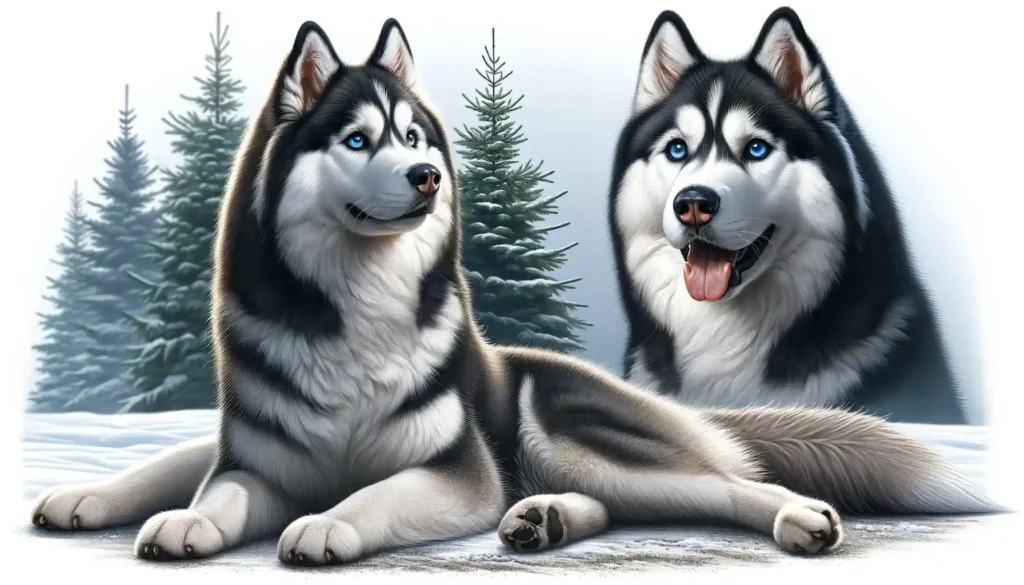Average Lifespan of a Husky

The average lifespan of a Siberian Husky is generally between 12 to 14 years. Several reputable sources confirm this lifespan range as typical for the breed when pairing genetic luck with responsible pet ownership.
Of course, some Huskies unfortunately pass away earlier than 12 years due to health conditions or accidents. But a well-cared for Siberian Husky that maintains relatively good health throughout life can potentially live to ages 15 or 16 years old, maybe even a bit beyond in exceptional cases.
To put those numbers into human terms for comparison:
- 12 dog years = 62 human years
- 14 dog years = 72 human years
- 16 dog years = 82 human years
So while the Siberian Husky may not have extreme longevity like some smaller dog breeds, reaching 12 to 16 years would mean living a very full life for a medium-large sized canine.
Skip to topic
Why Do Huskies Have a Shorter Than Average Lifespan?
Several variables influence an individual Husky’s lifespan, causing some to veer on the shorter or longer end of the average range:
Genetics – Some hereditary conditions like eye issues, seizures, and cancer may impact lifespan for susceptible bloodlines if not carefully screened by the breeder. Choosing reputable Siberian Husky breeders can give your dog better genetic odds.
Preventative Care – Following veterinarian recommended schedules for exams, vaccines, preventatives like flea & tick medication, heartworm tests, and dental cleanings maintains overall health. Catching any issues early on gives better prognoses. Annual checkups for senior dogs are key.
Spay/Neuter Status – Altered dogs see health and lifespan benefits versus intact dogs by eliminating reproductive cancer risks. Siberian Huskies should ideally be “fixed” unless carefully health tested and approved for responsible breeding.
Weight – Keeping your Husky trim and fit avoids obesity straining vital organs like heart, lungs, and joints. The breed is prone to weight gain from the wrong diet and lack of exercise. Lifelong healthy body condition ranks highly among longevity factors.
Diet & Nutrition – Feeding an age-appropriate quality diet for puppy, adult and senior developmental stages provides complete balanced nutrition without excess. Homemade meals need proper formulation too.
Lifestyle Factors – Mentally and physically stimulating Huskies sufficiently with adequate outdoor exercise and playtime in a safe environment enriches their life. Accounting for their high intelligence and athletic demands is crucial for happiness.
The Most Common Health Issues Impacting Lifespan

If you want your Siberian Husky to live a long and healthy life, it’s important to be aware of the health issues the breed is prone to. Some of the most common include:
- Eye disorders – Huskies can develop cataracts, glaucoma, corneal disease, and progressive retinal atrophy. Eye exams every year help detect issues early.
- Hip dysplasia – This painful joint condition should be screened for as it leads to arthritis over time. Keeping your dog thin lessens the strain.
- Hypothyroidism – An underactive thyroid is common in Huskies, causing hair loss, weight gain, and lethargy. Medication to regulate thyroid hormone may be needed.
- Dental disease – Huskies are prone to gingivitis, tooth fractures, and tooth loss. Daily tooth brushing and professional cleanings maintain dental health.
- Allergies – Both food and environmental allergies occur often, causing itchy skin and ear infections. Managing allergies prevents recurring issues.
- Cancer – Huskies are at higher risk for certain cancers like blood cancers, malignant histiocytosis, and gastric cancer. Early detection and treatment can prolong life.
Help Your Husky Live a Long, Fulfilling Life
Ensuring that your Husky lives a long, fulfilling life involves a combination of proper diet, regular exercise, health care, and emotional well-being.
Firstly, a balanced diet tailored to their energetic needs is crucial; high-quality dog food rich in protein helps maintain their thick coat and supports their high energy levels.
Regular veterinary check-ups are essential to monitor and address any health concerns early, including common issues in Huskies like hip dysplasia and eye problems.
Exercise is a key component of a Husky’s life. They are a high-energy breed, so daily exercise, including long walks, runs, and play sessions is vital to keep them physically and mentally stimulated.
Mental stimulation can also come from training sessions and interactive toys, which can help prevent destructive behaviors born from boredom.
Social interaction is important for this breed. Huskies are pack animals and thrive in social environments, so regular interaction with other dogs and humans is beneficial. Grooming is also important; regular brushing helps manage their thick coat, especially during shedding seasons.
Lastly, ensure they live in a suitable environment. Huskies are better suited to cooler climates due to their thick coats, so if you live in a warmer area, providing a cool, shaded area and plenty of water is essential to prevent overheating.
By addressing these key areas, you can help your Husky lead a healthy, happy, and long life.
While the average Husky lifespan is lower than other breeds, excellent care from puppyhood throughout life will help ensure your dog lives a long, healthy, and happy life full of memorable adventures with you! Work closely with your vet and dog care team to provide the very best for your Husky.
In Conclusion
The typical lifespan of a Siberian Husky is between 12-14 years on average, with properly cared for Huskies reaching 15 to 16 years in some cases. While the breed’s striking good looks and outgoing temperament make them very desirable pets, candidates must make an educated commitment to meet their extensive physical and mental needs in order to offer them their best longevity.
Providing high quality nutrition, enforcing healthy body condition, supplying adequate exercise outlets, addressing any medical issues promptly, consistently tending to routine wellness care, and screening hereditary health clearances for issues like eye, thyroid and orthopedic disorders sets up a Husky for achieving a long, vibrant life.
If you adore Huskies and are prepared to support their unique care demands through the senior years, the payoff of an intense loyal companion for potentially over a decade and beyond is incredibly rewarding! Do your homework before bringing one of these striking dogs home though. A Husky deserves an owner committed completely to their welfare in order to have the chance at a longer than average lifespan.



